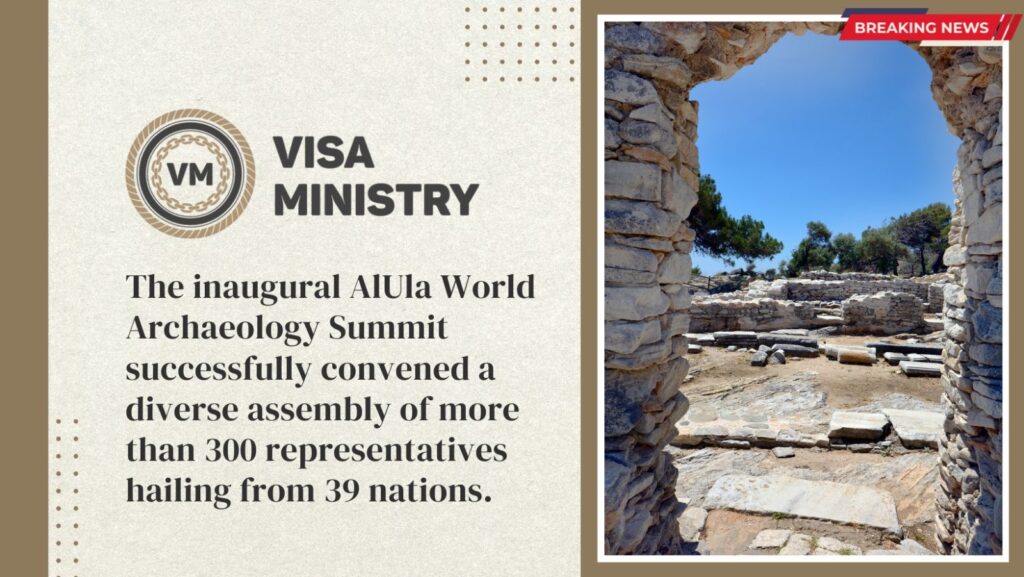During the commencement of the inaugural AlUla World Archaeology Summit, attendees were informed about the significant influence of archaeology in shaping cultural identity and fostering a collective human experience. Additionally, archaeologists were urged to actively pursue enhanced connectedness among their peers and to refrain from exhibiting cultural bias in their work.
The summit, which is being coordinated by the Royal Commission for AlUla (RCU), has attracted more than 300 delegates from 39 different nations to AlUla, located in the north-west region of Saudi Arabia. Over the course of two days, these participants engage in comprehensive talks regarding the role of archaeology in effectively managing and preserving history, with the ultimate goal of bringing about significant societal transformations.
During a panel discussion, Dr. Khaled Melliti, a historian and researcher affiliated with France’s National Centre for Scientific Research (CNRS), emphasized the importance for archaeologists to consider not only their own identities but also the identities of the sites they are digging or studying.
Professor Emanuelle Papi, the head of the Italian School of Archaeology in Athens, agrees that any age of archaeology can be seen as modern archaeology. This perspective allows individuals to perceive the past through the lens of their own time.
The author observed that in Italy, there existed a period during which the grandeur of Rome’s Imperial age played a fundamental role in shaping the nation’s identity. According to the speaker, during the process of excavating Roman ruins, archaeologists of that particular era would often disregard relics from subsequent historical periods, like the Middle Ages, Byzantine, and Renaissance eras.
In a similar vein, Dr. Melliti observed that subsequent to Tunisia’s transition to democratic governance subsequent to the revolt of 2010-11, there has been a corresponding shift in the perception of the nation’s archaeological legacy. Following the conclusion of the uprising, he articulated, “We have ascertained the presence of a republic that lies beneath the Tunisian terrain.”
The remarks made by the individuals conveyed the overarching objective of the summit, which is to foster novel dialogues that transcend the narrow focus of experts and instead explore avenues that establish links between archaeology and broader communities.
The importance of establishing stronger links with local populations was identified as a means for archaeologists to prevent the imposition of their own cultural perspectives on heritage.
Lucy Semaan, the principal maritime archaeologist stationed in Lebanon and affiliated with the Honor Frost Foundation, stated that during her underwater investigations, she engages in conversations with local fishermen to gather information regarding their fishing practices and the terminology they employ to designate different aquatic areas. According to her, this can be advantageous in facilitating a deeper understanding of historical continuity between the past and the present.
Professor Robert Hoyland, an esteemed scholar specializing in Late Antique and Early Islamic Middle Eastern History at New York University, recounted his inaugural archaeological mission in Syria. During a certain instance, he entered a commercial establishment and informed the proprietor of his engagement in the excavation of a Roman settlement. No,” she asserted, “you are engaged in the excavation of an Arab settlement dating back to the Roman era.
At the commencement of the day, Amr AlMadani, Chief Executive Officer of the Royal Commission for AlUla (RCU), extended a warm welcome to the delegates in AlUla. The individual observed that the Royal Commission for AlUla (RCU) demonstrates a commitment to sustainable tourism principles, which in turn contributes to the preservation and enhancement of cultural heritage assets.Our idea does not revolve around utilizing heritage as a means to attract people. The individual expressed the concept of utilizing visitors as a means to support and maintain cultural heritage.The summit will resume tomorrow, centering its attention on the themes of resilience and accessibility. This will serve as a complementary continuation of the previous day’s discussions, which mostly revolved on the topics of identity and ruinscapes.
The attendees of the conference convened on Wednesday for a formal supper held amidst the palm groves at the historic oasis of Daimumah. In his address, Levison Wood, an adventurer and writer, made an observation regarding the summit, highlighting its significance as a trip of exploration. Wood further emphasized that this expedition carries on the tradition established by previous explorers and pioneers who have ventured in the same region, such as Ibn Battuta, Gertrude Bell, and Lawrence of Arabia.
The AlUla World Archaeology Summit is an international gathering focused on the field of archaeology.
The city of AlUla is seeing a growing prominence as a center for archaeological endeavors, with the Royal Commission for AlUla (RCU) organizing the first-ever AlUla World Archaeology Summit, scheduled to occur from September 13th to 15th, 2023.
The summit serves as a forum for the progression of archaeology and the management of cultural heritage, particularly in their intersection with several other academic fields. The assembly of individuals from academia, government, non-government organizations, industry, and young scholars who represent the future of archaeology aims to enhance the archaeological community and safeguard collective history. Moreover, it seeks to foster a broader contemplation on the potential contributions of archaeology and cultural heritage to transformative societal changes.
Source- Travel daily
Link- https://www.traveldailymedia.com/first-alula-world-archaeology-summit-gathers-over-300-delegates-from-39-countries/
